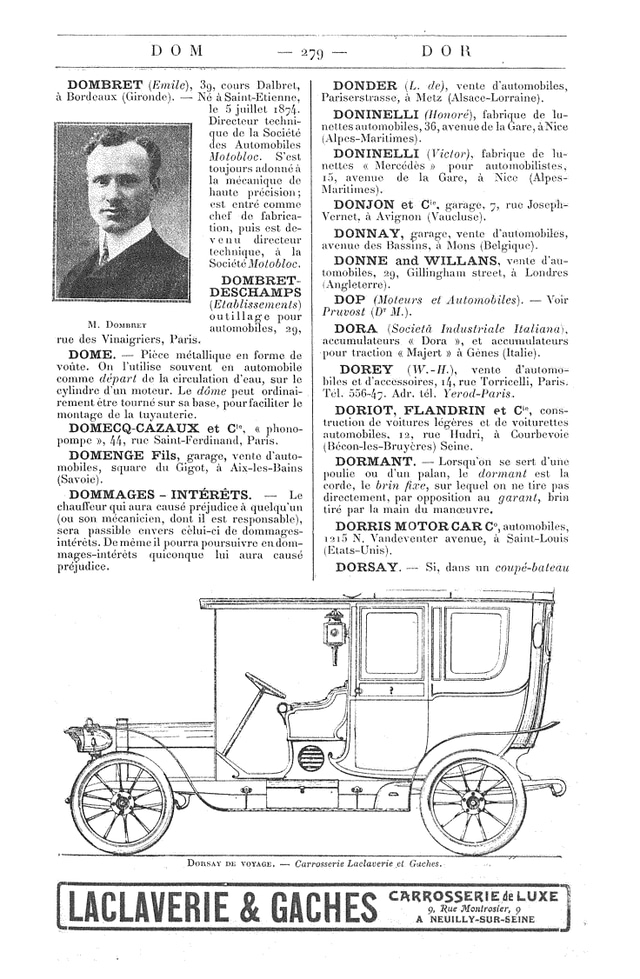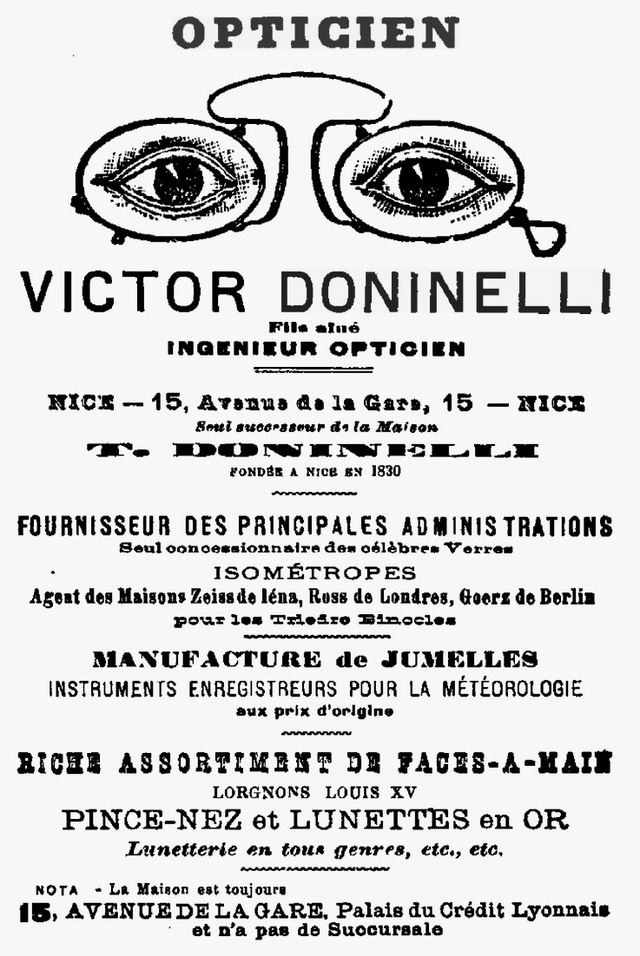

The Doninelli company was founded in Nice (then still part of Savoy) around 1830. Its founders were members of the Doninelli family of Italian origin, who had settled on the French Riviera. By the mid-19th century, the firm had established itself as a well-known optical workshop. In a city guide from 1860, Théodore Doninelli is mentioned with the designation “fils, opticien” (“son, optician”), which indicates that Théodore was the heir of the original founder and continued the family business. Under the name “Doninelli Fils, opticien à Nice” (“Doninelli Son, optician in Nice”), the company was active during the mid-19th century. The activity of the Doninelli house spanned at least from the 1830s to 1900, thanks to generational continuity.
By the second half of the 19th century, leadership of the firm passed to the next generation—Victor Doninelli. According to some sources, by the mid-1860s Victor had effectively taken charge of the enterprise. He bore the title “ingénieur-opticien” (engineer-optician) or “ingénieur-fabricant” (engineer-manufacturer) and significantly expanded both the product range and technical standards of production. His shop was located at 15, Avenue de la Gare in Nice, the city’s main thoroughfare leading from the railway station. At the turn of the 19th to 20th century, Victor Doninelli was regarded as one of the leading opticians in the region. Advertising directories from the early 20th century describe him as the “célèbre opticien” of Nice, noting that he not only sold but also manufactured binoculars and meteorological instruments (barometers, thermometers, etc.). On the dials of surviving barometers from this period one can still see the inscription “Victor Doninelli, Nice, 15 Avenue de la Gare”, attesting to the company’s distinctive mark. Victor successfully ran the business until the early 20th century, when it passed to the next generation.
In the early 20th century, the family business was continued by Honoré Doninelli, Victor’s son and Théodore’s grandson. It is likely that during Victor’s lifetime the firm began to operate under the name “V. & H. Doninelli”, reflecting the partnership between father and son. In advertisements, Honoré is described as an “opticien-constructeur” (optician-constructor), underlining that he was not merely a retailer but also a maker of instruments. Surviving optical instruments from this period, such as opera glasses, bear inscriptions like “H. Doninelli – 36 Avenue de la Gare, Nice”, confirming his authorship. Honoré Doninelli enjoyed an excellent reputation in Nice: the local press of the late 1920s referred to him as the city’s “most renowned optician.” In 1929, newspapers reported on the wedding of his daughter, describing Honoré himself as “notre excellent ami… l’opticien bien connu” (“our excellent friend, the well-known optician”). This shows that the Doninelli firm remained a visible part of civic life in Nice up until the late 1920s. After that, traces of the family’s activities disappear from the sources, suggesting the company ceased operations in the early 20th century.
An additional source of information about the activities of the Doninelli family is the authoritative French directory Annual Baudry de Saunier. Manuel général de l’industrie automobile, published in Paris from the early 20th century and serving as a kind of “encyclopedia” of the automobile industry. In the 1907 edition, under the section of manufacturers and merchants, two members of the family are listed: “DONINELLI (Honoré), fabrique de lunettes automobiles, 36, avenue de la Gare, à Nice (Alpes-Maritimes). DONINELLI (Victor), fabrique de lunettes ‘Mercedes’ pour automobilistes, 15, avenue de la Gare, Nice (Alpes-Maritimes).” These entries confirm that by the beginning of the 20th century the Doninelli enterprise extended beyond traditional optics and meteorological instruments to include the production of specialized accessories for motorists, notably “automobile glasses,” which were indispensable in the era of open cars.
A distinctive feature of the Doninelli dynasty was the combination of retailing finished instruments with in-house manufacturing of optics and scientific devices. Already by the mid-19th century, Théodore Doninelli was producing instruments; one known example is a marble sundial around 1860, signed “Doninelli Fils, opticien à Nice.” During Victor’s tenure, the range expanded considerably—he personally designed and offered binoculars, telescopes, barometers, thermometers, and other meteorological and optical instruments. Advertisements from the 1900s explicitly stated that “Victor Doninelli fabrique des jumelles et des instruments météorologiques” (“manufactures binoculars and meteorological instruments”). His title “ingénieur-fabricant” emphasized his engineering approach to craftsmanship. Honoré Doninelli carried on this tradition: the word “constructeur” in his title implied that the shop maintained a workshop for both the manufacture and repair of optical instruments. Customers could acquire corrective spectacles and spyglasses, as well as complex scientific instruments bearing the Doninelli mark. Surviving examples—opera glasses, microscopes, barometers, and more—attest to their high quality and are of considerable interest to collectors today.
Throughout its history, the Doninelli company was based in Nice on the French Riviera. Unlike some of the major Parisian optical houses, the Doninelli firm never established a network of branches across France—their shop and workshop remained firmly rooted in Nice. Nevertheless, thanks to the city’s status as a fashionable resort and its international clientele, the reputation of the Doninelli instruments spread widely. Their products reached customers across France and Europe, and the Doninelli name appeared in trade directories and catalogues alongside those of leading opticians in Paris, Lyon, and other centers. For instance, in one early 20th-century directory Victor Doninelli is listed as the representative optician of Nice among France’s leading practitioners. Thus, while geographically limited to Nice, the company’s influence extended beyond the city itself.
The Doninelli firm remains an important chapter in the history of optics on the French Riviera. Over roughly seven decades of activity (1830s–1900s), three generations of the Doninelli family contributed to the development of optical instrument trade and manufacture in France. Their name became associated with quality and technical innovation, and their shop formed part of the cultural and commercial fabric of Nice during an era when precision instruments—from eyeglasses to barometers—stood at the forefront of scientific and technical progress. The history of the Doninelli family vividly illustrates the evolution of a craft workshop into a dynastic enterprise, preserving traditions of quality from its founding in the 1830s until its closure in the early 20th century.